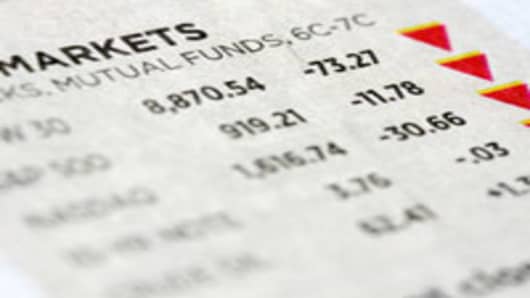When the British Financial Stability Board was established a couple of years ago, it declared that one of its goals was to produce better "early warning" systems of looming financial trouble spots. Now it is turning this rhetoric into reality. Investors should pay attention.
Last month, the FSB issued a small advisory report entitled: "Potential financial stability issues arising from recent trends in exchange-traded funds". Unsurprisingly, this did not cause a storm. After all, ETFs seem as dull as ditchwater to most politicians; almost as boring as the world of collateralized debt obligations looked before 2007.
But this little FSB report deserves wider attention.
For one thing, it has not emerged by chance: on the contrary, it was published because some institutions such as the Bank of England have been quietly sounding alarm bells about ETFs for some time.
But secondly, the issues raised are sobering - not least when I read this report I feel an uncanny sense of déjà vu with some of the trends that bedeviled the similarly "boring" world of CDOs five years ago.
The central problem is that the ETF sector (like the credit markets five years ago) is currently in the grip of a wave of investor enthusiasm that risks turning a fundamentally sensible innovation bad.
When the idea of ETFs first cropped up a couple of decades ago, they seemed profoundly beneficial. After all what these instruments in effect do is allow investors to diversify their portfolios and gain access to a host of different investment classes without having to pay excessive fees to active managers.
And since these products are listed on exchanges, they potentially provide more transparency than other investment vehicles. Armed with this sales pitch, banks have rushed to market ETFs, with growing success.
The FSB calculates, for example, that by the third quarter of 2010 the ETF sector had $1,200 billion of assets after growing at an average annual rate of 40 percent in the past decade (far higher than hedge funds or mutual funds). And as volumes have swelled, a subtle twist has recently occurred.
As interest rates have fallen, and investors become increasingly desperate for yield, banks have become more creative about how they structure ETFs. In the last couple of years, there has been a boom in synthetic ETFs, which use derivatives or structured products; these have apparently "developed very rapidly in Europe to reach 45 percent of that market", the FSB notes.
Some ETFs are also using leverage, or purchasing riskier assets such as risky loans. Now, in theory there is nothing wrong about the use of derivatives or leverage, if investors understand the risks. And banks insist that the quoted nature of ETFs means that they are radically more transparent - and thus "safe" - than, say, CDOs.
But therein, perhaps, also lies a risk: precisely because ETFs have a reputation for being so "dull" and "safe", it is not clear investors do understand all the potential risks.
And even if they do understand the individual products, the bigger structural impact of the ETF boom is not well understood. The FSB, for example, says that it is concerned that there could be significant liquidity mismatches and poor collateral practices in the industry.
It is also worried that conflicts of interest can arise from the dual role of some banks as ETF provider and derivative counterparty. However, there is another more basic issue too: precisely because the market has exploded with such stunning speed, it may be changing flows in some asset classes.
The commodities sector is one case in point: the recent ETF boom is probably as important (if not more so) as anything hedge fund "speculators" are doing to shape prices.
However, equity markets are also affected, along with some more esoteric sectors. As I noted in a recent column, for example, the recent swings in the Vix volatility index may reflect the recent boom in volatility-linked notes. Now, there are some ultra canny hedge funds that understand these shifts and are duly trading to take advantage of them in particular corners of the market.
But as the FSB notes, "the impact of such innovations on market liquidity and on financial institutions servicing the management of the fund is not yet fully understood by market participants, especially during episodes of acute market stress".
If a crisis hits, in other words, nobody quite knows what will happen because this sector has exploded so fast - and hitherto been ignored because it is "dull".
Now that is not necessarily a reason to panic.
After all, the fact that the FSB has published this note shows that regulators want to prevent a replay of that CDO debacle. But the key question, of course, is whether investors and bankers have learnt the right lessons.
That FSB report, in other words, should be required reading for investors; even - or especially - in a seemingly "safe" world of ultra-low interest rates.


